Occupy Central
Occupy Central is a civil disobedience movement which began in Hong Kong on September 28, 2014. It calls on thousands of protesters to block roads and paralyse Hong Kong's financial district if the Beijing and Hong Kong governments do not agree to implement universal suffrage for the chief executive election in 2017 and the Legislative Council elections in 2020 according to "international standards." The movement was initiated by Benny Tai Yiu-ting (戴耀廷), an associate professor of law at the University of Hong Kong, in January 2013.
OCCUPY CENTRAL - DAY 51: Full coverage of the day’s events
PUBLISHED : Monday, 17 November, 2014, 5:08am
UPDATED : Monday, 17 November, 2014, 5:10am
Time for new leadership in Hong Kong
To mitigate the threats from the Occupy protest, HK should have a directly elected legislature with the chief executive appointed by Beijing
Joshua Wong (left) and Leung Chun-ying. Photos: SCMP
In War and Peace, Leo Tolstoy played down the role of human agency in shaping events, writing that "a king is history's slave".
Historical events can easily overtake any leader and civil disobedience evolve into civil resistance as government and business leaders refuse to understand and respond to events.
Seen in that context, the threats that confront Hong Kong's economy and society are likely only to worsen.
For a taste of how the young generation sees that confrontation shaping up, read the article written by Occupy Central's teenage talisman, Joshua Wong Chi-fung, published in the New York Times on October 29.
"I would like to remind every member of the ruling class in Hong Kong. Today you are depriving us of our future, but the day will come when we decide your future. No matter what happens to the protest movement, we will reclaim the democracy that belongs to us, because time is on our side."
For some, this is effectively a declaration of war on Hong Kong's business and government elite. It is smarter to think about it as the core of a manifesto for change in this city. Because when a teenage student can inspire and communicate to people better than any of the government and business leaders, it is time to conclude that the city's elite is incapable of producing respectable and credible leaders.
Only bold reform will prevent Hong Kong and the mainland from becoming two peoples
Occupy Central has proven that the concept of having this capital of global commerce led by a business-oriented government now lies in tatters. And that is no surprise because business people are uniquely unqualified for governing societies. Tycoons cannot easily comprehend the swelling tide of important political and social forces.
Debating change within the stifling borders of the Basic Law has become a dreary affair. Playing with the functional constituencies and nomination committee rules does not deliver anything close to a truly representative government.
Since 1997, Hong Kong and the mainland have changed much faster and differently than anticipated. In 1997, some thought the city would lead the mainland into the world. Today, the mainland is a global leader and no Hong Kong business or government leader makes much of a difference to the country at large. The only sensible solution is to scrap our present form of government and replace it with a system where the chief executive is appointed directly by the central government.
While doubtlessly an unpopular idea, the advantage is that such a chief executive would be a bureaucrat and probably from the foreign service. He would be like a colonial British governor without the career baggage of entrenched local relationships and loyalties and would have to work through an elected legislature.
We should also dismantle functional constituencies and corporate block voting and replace them with representatives of geographic districts elected by one person, one vote to a new Legislative Council. The new Legco and the chief executive could table legislation.
The chief executive would appoint a cabinet from a mix of Legco members and approved non-elected officials. This would cultivate true democratic development of respected institutions while giving the chief executive veto power that Beijing would feel its interests protected.
And like the president of the United States, the chief executive would have to be careful about exercising veto power lest he precipitate protests from legislators or spark another Occupy groundswell protest movement.
For all of its flaws, the US is a vibrant democracy in which elections matter. Even if a new system in Hong Kong may still not have a directly elected chief executive, the entire Legco would be. That seems to be a workable compromise. And we need one because Occupy's ideas will not diminish. The yearning howl of youth will echo down this generation and risks unsettling the city.
Only bold reform will prevent Hong Kong and the mainland from becoming two peoples between whom there is no intercourse and no sympathy.
Peter Guy is a financial writer and former international banker
This article appeared in the South China Morning Post print edition as Time for new leadership
Survey confirms the Occupy Central generation gap in Hong Kong
Survey highlights that younger and more educated people tend to back the protest - but for the first time supporters are in the minority
PUBLISHED : Monday, 17 November, 2014, 6:45am
A woman walks past a protest zone in Mong Kok, in front a partial road sign that reads "stop". Support for the protest movement is falling, according to a poll. Photo: Sam Tsang
A poll continues to show a generation and education gap in people's opinions towards the Occupy movement.
 Younger or more educated respondents tend to support the pro-democracy movement more, a finding consistent with the survey's results for the previous two months.
Younger or more educated respondents tend to support the pro-democracy movement more, a finding consistent with the survey's results for the previous two months.
Despite the divided opinions between people of different ages, education levels and political beliefs, the poll shows that almost 70 per cent of respondents believed the protesters should leave now. And for the first time since the survey began in September, the percentage of those who did not support the movement surpassed that of supporters.
"There is a generation gap," said Paul Lee Siu-nam, a journalism professor at the Chinese University and one of the researchers. "This gap not only exists during the Occupy movement; we have seen such division on various other social issues."
From November 5 to 11, researchers from the Chinese University's Centre for Communication and Public Opinion Survey interviewed 1,030 Hong Kong citizens aged 15 or older and able to speak Cantonese via telephone.
Some questions - such as if the Occupy protesters should go home - were not asked in the poll in September and October.
More than 43 per cent of respondents said they did not support the Occupy movement - last month the figure was about 35 per cent. The percentage of respondents supporting the movement was now 34 per cent.
In a more detailed breakdown, more than 67 per cent of those aged 15 to 24 said they supported the movement. Among those aged 40 or more, support stood at 27 per cent. Almost 46 per cent of those with a tertiary education supported the movement, dropping to 21 per cent among respondents with a junior secondary or lower education. Although more than 67 per cent of respondents believed the protesters should go home - 14 per cent believed the opposite - researchers pointed out that more than half of respondents believed the government needed to give more detailed concessions to resolve the current stand-off.
"Both sides need to consider how they can respond to the people's opinions," said Francis Lee Lap-fung, who is also a Chinese University journalism professor and one of the researchers.
Again, opinions divide along generational lines over this question, with up to 83 per cent of those aged 40 and older believing protesters should leave but only 21 per cent of those aged 15 to 24 thinking the same. A similar division is observed among people with different education levels.
Researchers said the decline in support for the movement could be related to the inconvenience the long-lasting occupation had caused to ordinary people.
Yvonne Leung Lai-kwok, one of the Occupy student leaders, said opinions were constantly changing so it would not be the only criteria for protesters to decide if they would end the occupation. She believed opinions would turn in favour of the protest in the wake of the ban on student leaders visiting Beijing.
The survey also found that more than 45 per cent of respondents believed lawmakers should pass the political reform package if the government scrapped corporate voting in the formation of the nominating committee. Thirty-six per cent were in favour of passing the package even if the government did nothing.
This article appeared in the South China Morning Post print edition as The Occupy generation gap
Hong Kong families split over support for Occupy Central protest
PUBLISHED : Monday, 17 November, 2014, 6:45am
Graduates take photos on the blocked road in Admiralty protest site of the Occupy Central movement. Photo: Felix Wong
It's not a student's job to meddle in politics: that's the message Kuby Chan received from her parents and one probably heard by many other young activists manning the Occupy barricades.
"My parents said students shouldn't take part in what the Hong Kong Federation of Students has organised, but instead, focus on their studies," said the 16-year-old, who has been out on the streets since the first day of the university class boycott on September 22. "They thought [students] were making a scene or staging a show," she said. "They had no idea why students had to do that."
Chan, who has been camping out on the streets every night over the past few weeks, said that after she decided to take a stance for democracy, her parents barely spoke to her.
But a transformation came after the most dangerous moment she experienced since she joined the movement.
A crowd had gathered outside Sin Tat Plaza in Mong Kok near where an anti-Occupy man was seen assaulting a protester. Chan was among the crowd that had the man surrounded by the time riot police arrived.
In the chaos, the teenager was hit on the back of the head by a police baton. Her parents found out the next day from her younger brother. "They asked me to take sufficient equipment with me [to protect myself]," Chan said. "Compared to their tough stance previously, their attitude has changed." .
Chan said the last generation who fought the same fight had not achieved reforms so it was now her generation's turn. "Maybe we will succeed," said Chan, who dropped out of school a year ago. "I won't succumb so easily this time."
Ngan Tsz-ho has not met or spoken to his mother since their fight on October 1 over his joining Occupy Central. He's even blocked his mother on smartphone messaging app Whatsapp, all because his mother is a "blue ribbon" member, opposing the pro-democracy movement and supporting the police.
"She said, 'Can democracy make money? Have I been raising you with democracy? You've never done anything good and you're going to have no relative, no friend and no parent soon'," Ngan said. "I felt it was too much. I felt she had no sympathy or conscience."
Ngan, a 22-year-old make-up artist, joined Occupy on September 28 - the day the protest began - and has stayed on Harcourt Road in Admiralty ever since.
Whenever he needs to go to his home in Chai Wan to shower or change clothes, he waits until his mother has gone to work and leaves before she returns.
Ngan's parents are divorced. While his father is not a "blue ribbon" member, he also did not support his son joining Occupy.
Running a frozen meat business in Chai Wan, his parents were close to some local pro-establishment district councillors and benefitted from their district policies, Ngan said. "My mum supports the councillors and they talked her into being against Occupy Central," he said.
Ngan hasn't participated in any previous protest and never thought he would join Occupy.
"I never liked [Chief Executive] Leung Chun-ying because he's told many lies, but this time he betrayed us," he said. "At first I just wanted to come for a day, but then when people were leaving and students were asking them not to go, I decided to stay, because I couldn't stop worrying about them."
This article appeared in the South China Morning Post print edition as Hong Kong families split over protest movement
Hong Kong police set to clear Occupy protesters 'this week'
PUBLISHED : Monday, 17 November, 2014, 6:45am
About 67 per cent of poll respondents said protesters should go home. Photo: Bloomberg
Police will take action "this week" to clear protesters from some occupied sites just as a new poll showed that nearly 70 per cent of the public wants the movement to end.
For the first time since it started the poll in September, Chinese University found more people opposed the Occupy movement than supported it. Of the 1,030 respondents, 43 per cent were against and 34 per cent for the movement - indicating a shift in public sentiment.
Even those who supported the democracy protests believed it was time to bring it to an end. About 67 per cent of all respondents said protesters should go home.
This came as a police source told the South China Morning Post that the force would take action "within this week" to help bailiffs implement court injunction orders against protesters occupying sites in Admiralty and Mong Kok.
But he said police would not carry out the action at "odd hours".
"The working hours of bailiffs are from 9am to 5pm on weekdays, so that's when it will happen," the source said. "Perhaps only an hour or two earlier [than 9am] at most, definitely not during the small hours.
"Citic [Tower in Admiralty] will be first, then Mong Kok," the source said, adding that it would happen tomorrow at the earliest.
The Mong Kok operation is considered "high risk". Each police officer could face up to three or four Occupy protesters there, the source said. He said all officers helping bailiffs in Mong Kok would be in full gear.
Police first needed to wait for instructions from the Department of Justice on how to provide assistance to bailiffs, according to the source. And he said police still had to clarify operational details such as whether "obstacles" to be removed include protesters.
The court will elaborate on its decision today.
Financial Secretary John Tsang Chun-wah in his weekly blog urged the protesters to stop their movement now or risk "losing the moral high ground".
"It is time to return to rationality … They should first convince the rest of Hong Kong people with their arguments," he wrote.
The Reverend Peter Douglas Koon, provincial secretary general of the Anglican Church, said in a TV talk show that the Occupy organisers had "greatly embarrassed the church" because Christians would now be perceived by others as radicals.
Occupy organisers the Reverend Chu Yiu-ming and Benny Tai Yiu-ting are Christians.
This article appeared in the South China Morning Post print edition as Police to clear Occupy protesters 'this week'
More than two-thirds say Occupiers should go home now as support wanes: poll
Survey highlights that younger and more educated people tend to back the protest - but for the first time supporters are in the minority
PUBLISHED : Monday, 17 November, 2014, 6:45am
A woman walks past a protest zone in Mong Kok, in front a partial road sign that reads "stop". Support for the protest movement is falling, according to a poll. Photo: Sam Tsang
A poll continues to show a generation and education gap in people's opinions towards the Occupy movement.
 Younger or more educated respondents tend to support the pro-democracy movement more, a finding consistent with the survey's results for the previous two months.
Younger or more educated respondents tend to support the pro-democracy movement more, a finding consistent with the survey's results for the previous two months.
Despite the divided opinions between people of different ages, education levels and political beliefs, the poll shows that almost 70 per cent of respondents believed the protesters should leave now. And for the first time since the survey began in September, the percentage of those who did not support the movement surpassed that of supporters.
"There is a generation gap," said Paul Lee Siu-nam, a journalism professor at the Chinese University and one of the researchers. "This gap not only exists during the Occupy movement; we have seen such division on various other social issues."
From November 5 to 11, researchers from the Chinese University's Centre for Communication and Public Opinion Survey interviewed 1,030 Hong Kong citizens aged 15 or older and able to speak Cantonese via telephone.
Some questions - such as if the Occupy protesters should go home - were not asked in the poll in September and October.
More than 43 per cent of respondents said they did not support the Occupy movement - last month the figure was about 35 per cent. The percentage of respondents supporting the movement was now 34 per cent.
In a more detailed breakdown, more than 67 per cent of those aged 15 to 24 said they supported the movement. Among those aged 40 or more, support stood at 27 per cent. Almost 46 per cent of those with a tertiary education supported the movement, dropping to 21 per cent among respondents with a junior secondary or lower education. Although more than 67 per cent of respondents believed the protesters should go home - 14 per cent believed the opposite - researchers pointed out that more than half of respondents believed the government needed to give more detailed concessions to resolve the current stand-off.
"Both sides need to consider how they can respond to the people's opinions," said Francis Lee Lap-fung, who is also a Chinese University journalism professor and one of the researchers.
Again, opinions divide along generational lines over this question, with up to 83 per cent of those aged 40 and older believing protesters should leave but only 21 per cent of those aged 15 to 24 thinking the same. A similar division is observed among people with different education levels.
Researchers said the decline in support for the movement could be related to the inconvenience the long-lasting occupation had caused to ordinary people.
Yvonne Leung Lai-kwok, one of the Occupy student leaders, said opinions were constantly changing so it would not be the only criteria for protesters to decide if they would end the occupation. She believed opinions would turn in favour of the protest in the wake of the ban on student leaders visiting Beijing.
The survey also found that more than 45 per cent of respondents believed lawmakers should pass the political reform package if the government scrapped corporate voting in the formation of the nominating committee. Thirty-six per cent were in favour of passing the package even if the government did nothing.
This article appeared in the South China Morning Post print edition as The Occupy generation gap
Hong Kong families split over support for Occupy Central protest
PUBLISHED : Monday, 17 November, 2014, 6:45am
Graduates take photos on the blocked road in Admiralty protest site of the Occupy Central movement. Photo: Felix Wong
It's not a student's job to meddle in politics: that's the message Kuby Chan received from her parents and one probably heard by many other young activists manning the Occupy barricades.
"My parents said students shouldn't take part in what the Hong Kong Federation of Students has organised, but instead, focus on their studies," said the 16-year-old, who has been out on the streets since the first day of the university class boycott on September 22. "They thought [students] were making a scene or staging a show," she said. "They had no idea why students had to do that."
Chan, who has been camping out on the streets every night over the past few weeks, said that after she decided to take a stance for democracy, her parents barely spoke to her.
But a transformation came after the most dangerous moment she experienced since she joined the movement.
A crowd had gathered outside Sin Tat Plaza in Mong Kok near where an anti-Occupy man was seen assaulting a protester. Chan was among the crowd that had the man surrounded by the time riot police arrived.
In the chaos, the teenager was hit on the back of the head by a police baton. Her parents found out the next day from her younger brother. "They asked me to take sufficient equipment with me [to protect myself]," Chan said. "Compared to their tough stance previously, their attitude has changed." .
Chan said the last generation who fought the same fight had not achieved reforms so it was now her generation's turn. "Maybe we will succeed," said Chan, who dropped out of school a year ago. "I won't succumb so easily this time."
Ngan Tsz-ho has not met or spoken to his mother since their fight on October 1 over his joining Occupy Central. He's even blocked his mother on smartphone messaging app Whatsapp, all because his mother is a "blue ribbon" member, opposing the pro-democracy movement and supporting the police.
"She said, 'Can democracy make money? Have I been raising you with democracy? You've never done anything good and you're going to have no relative, no friend and no parent soon'," Ngan said. "I felt it was too much. I felt she had no sympathy or conscience."
Ngan, a 22-year-old make-up artist, joined Occupy on September 28 - the day the protest began - and has stayed on Harcourt Road in Admiralty ever since.
Whenever he needs to go to his home in Chai Wan to shower or change clothes, he waits until his mother has gone to work and leaves before she returns.
Ngan's parents are divorced. While his father is not a "blue ribbon" member, he also did not support his son joining Occupy.
Running a frozen meat business in Chai Wan, his parents were close to some local pro-establishment district councillors and benefitted from their district policies, Ngan said. "My mum supports the councillors and they talked her into being against Occupy Central," he said.
Ngan hasn't participated in any previous protest and never thought he would join Occupy.
"I never liked [Chief Executive] Leung Chun-ying because he's told many lies, but this time he betrayed us," he said. "At first I just wanted to come for a day, but then when people were leaving and students were asking them not to go, I decided to stay, because I couldn't stop worrying about them."
This article appeared in the South China Morning Post print edition as Hong Kong families split over protest movement

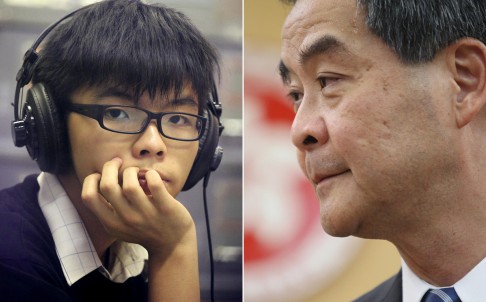
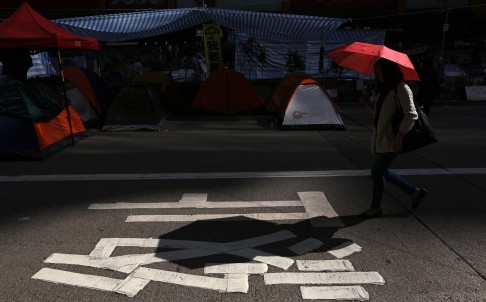
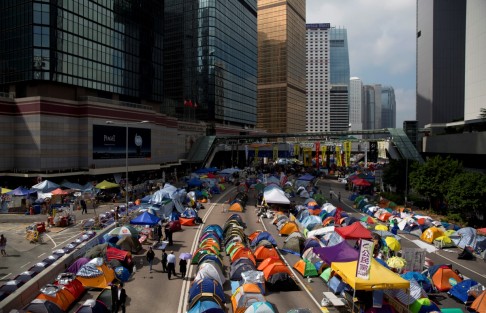
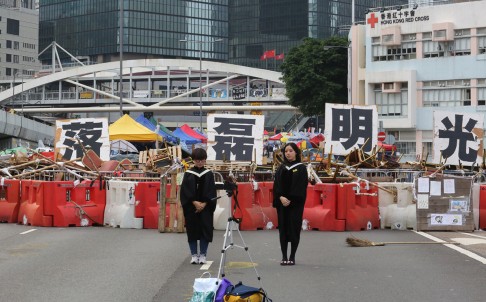
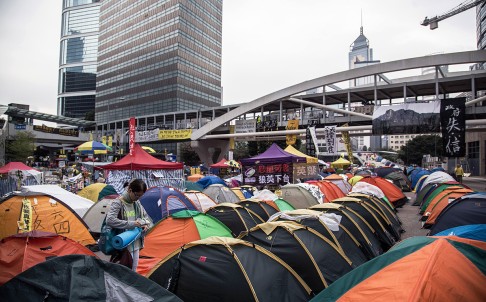
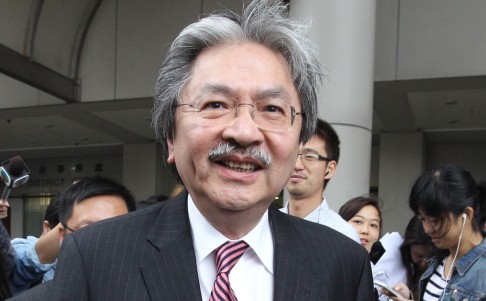
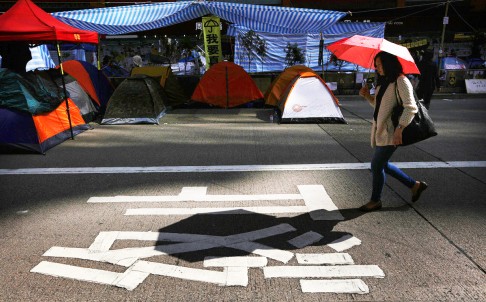

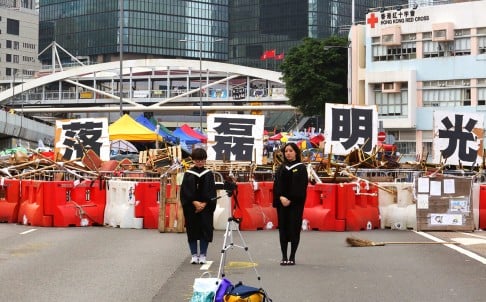
沒有留言:
張貼留言